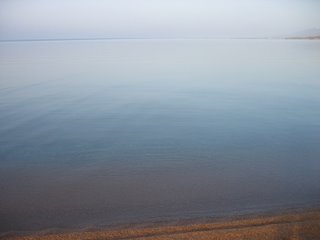
March 26, 2006
At 7:10, I was already outdoors, eager to take a walk along the beach before the 8 a.m. breakfast. I walked through the dull and faded sanatorium grounds, lit up by the bushes flowering yellow. On the beach, the sand glowed a golden brown under a light coating of frost in the soft light of morning. Water lapped gently onto shore, pale and limpid. I looked straight into the sandy bottom. The sky, a pale whitish-blue, blended with the lake.
The sanatorium, behind me, was almost invisible, dwarfed by the snow-peaked mountains rising up behind it. I watched a man jogging – running forwards, backwards, sidestep, as though he were dancing. I could tell he was here for his health and that he was taking every opportunity he had to improve it.
After breakfast with the same women I’d eaten dinner with, I headed back on the rock. My first stop was at the Bosteri market, which was already in full swing. The once-weekly market was filled with the excitement of people buying and selling, having traveled from throughout the region to gather and trade. The most people crowded around the fruit tree sellers. This region is known for its apples, pears and apricots. One of the spindly little branches I saw for sale would yield fruit in two years.
An old green Zhiguli pulled out in front of me, fruit trees tied to the top and hanging out of the trunk. An entire family of oversized, aging Russians packed the small vehicle. A little baby with a kerchief on her head poked her head out from the large bodies surrounding her and smiled at me.
From Bosteri, I rode a few kilometers to Cholpon-Ata, the tourism central town.
Yesterday I’d moved from softer land into drier, more rocky territory, from an agricultural zone to a more developed tourism area. As it wasn’t yet tourist season, I didn’t have to deal with the crowds. I found myself in a harsh, rocky, inhospitable area, where people lived poorly, but had a view of the lake over the rubble.
I was there to see the petroglyphic rocks and I found them a little ways off the main road. These remnants from the Saka-Usun date mostly from the 8th century BC to the 5th century AD.
A couple young boys herding goats approached me and pointed out the best rock drawings, including goats, hunters, and ibex. There were also stone circles and tombs, remarkable remainders of a civilization long disappeared. When I offered the kids 50 cents to buy themselves chocolate, they smiled and walked away happy.
Many of the small, neat homes in the village of Kara-Oi set up roadside stands – selling a little bit of everything to the vehicles passing by. It wasn’t even tourist season, and I found all the following for ready sale – apples, pears, potatoes, mushrooms, flour, animal furs, a cow, sheep, bull, tractor, home and store.
I rode under a sunny sky, with a light breeze and the music of chirping birds. The scenery alternated between rough, rocky, barren segments and nice views of the lake beyond the rocks and scrub. My favorite scene was another pair of ancient mud graves that rose like fortresses behind me. Further on, brown mountains drizzled with snow rose above them. It amazed me to find such a combination of history, culture and nature, right on a major roadside.
I’ve traveled this road about ten times in the past. But I realize by biking it how many villages and other sites I didn’t notice. Coming through on a bicycle lets me take in the places with all my senses, not just see a sight whipping by.
When I reached my destination, Tamchy, I flagged down an ancient red bus. The driver made room for my bike in the back and I walked down the aisle to the only open seat. Kyrgyz filled the bus – men in kalpaks and women in headscarves. When I sat down, the men turned and looked at me, with seemingly impressed expressions. My seatmate, who was drinking a homemade drink made of wheat, hops and milk, looked out at the mountains and said, “Each time you go to the mountains, they reveal one of their secrets to you.”
I couldn’t agree more. I breathed in the scent of alcohol, fish and dust and settled in for the slow, easy ride to Bishkek.



No comments:
Post a Comment